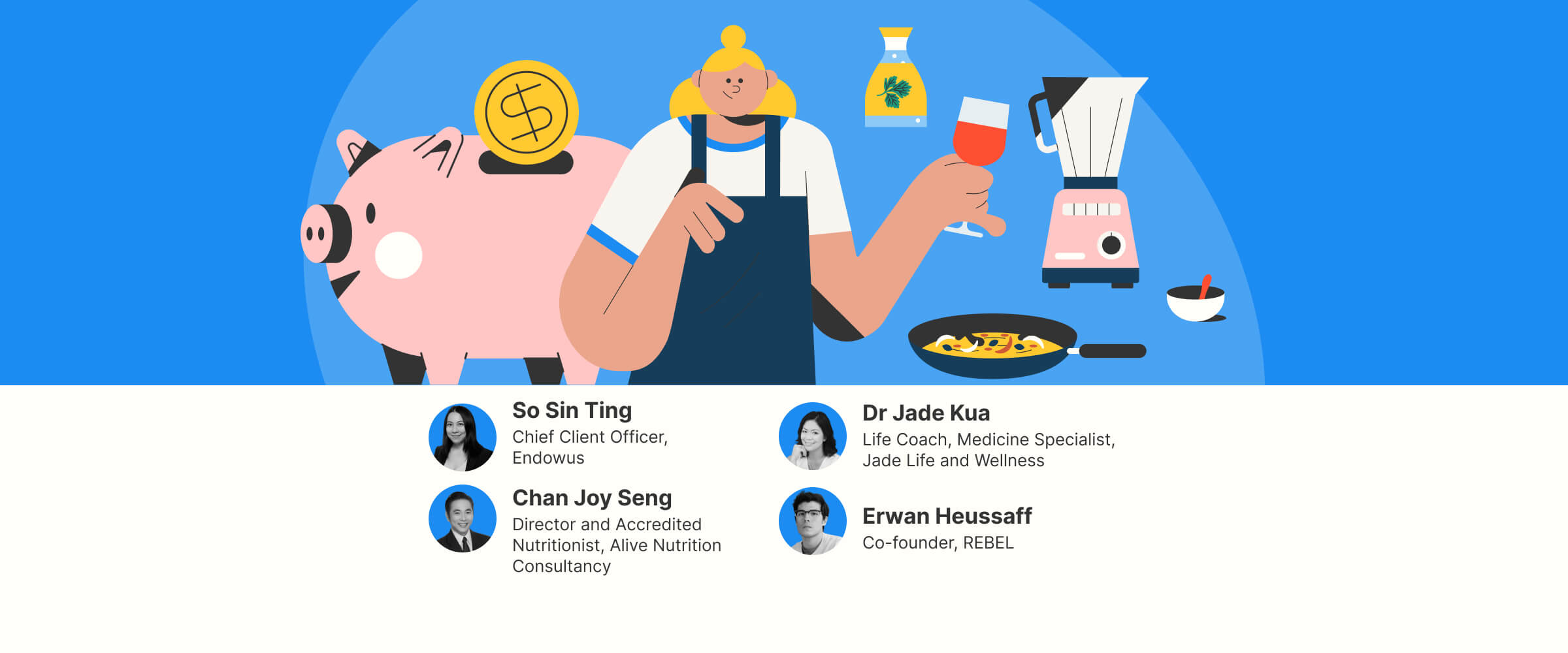Physical and mental health go hand in hand, which is why it’s important to remember that neglecting one will ultimately impact the other. While exercise is a big contributor, nutrition also plays a significant role in bodily health and holistic wellbeing.
“What we consume affects our physical body, one component of which is our brain, which controls our mental and emotional health,” said Chan Joy Seng, Director and Accredited Nutritionist at Alive Nutrition Consultancy, at Intellect’s Mental Health Festival 2023.
Catch up on the session titled “Achieving Holistic Health through Financial, Nutritional, and Physical Wellbeing” here:
The same goes for financial and mental wellbeing. Studies have shown that financial worries are closely associated with higher levels of psychological distress. And as debt may trigger poor decision-making, what ensues is a vicious cycle where feelings of anxiety compound.
At our recent Mental Health Asia 2023, we gathered a panel of financial, medical, physical, and nutritional experts to share actionable tips on how improve our mental health through holistic wellbeing.
Financial wellbeing
Mental and financial health are deeply intertwined. “A BlackRock study showed that money is the number one cause of stress in Singapore, especially for millennials,” shared So Sin Ting, Chief Client Officer at Endowus.
Much of that stress stems from feelings of anxiety over future financial security, which has been multiplied by economic uncertainty and fluctuating interest rates. To maintain a healthier financial outlook, Sin Ting recommends the following strategies.
“Marie Kondo” your finances
Tidying up your finances is very much like tidying up your room. Start by unpacking everything, stepping back, and taking a good look at what you own and what you owe. This requires some form of organisation or expense tracking, so you can see where most of your money goes.
From there, you can start “throwing out” unnecessary expenses. For example, do you really need to be subscribed to three video streaming services? Here are some other questions you may ask yourself:
- Does your budget need to be revised?
- How much are you spending on needs and wants?
- Do you have a plan for paying off debt?

Build an emergency fund
Setting aside a sum of money as a buffer or safety net can help reduce any anxiety you might feel about “what if” scenarios.
“This is money you would set aside for those unexpected emergencies,” said Sin Ting, “And I think having this in place really takes a huge weight off your shoulders and gives you that peace of mind.”
An emergency could be a sudden medical expense, a car repair, or even a temporary loss of income. The rule of thumb for emergency funds is that it should cover at least 6 months’ worth of your living expenses.
Set goals and start investing
There is no one-size-fits-all when it comes to financial goals. For some, it could be building a retirement fund. For others, it could be purchasing a home. Once you’re clear on what your goals are, you can start figuring out a game plan, which could entail looking into robo-advisors.
42% of Singaporeans believe that they don’t have enough funds yet to start investing. But Albert Einstein famously called compound interest the eighth wonder of the world for good reason, and Sin Ting recommended starting small and early rather than waiting around for the “right time.”
“If you start investing smaller amounts early and regularly, you can really enjoy the benefits of compounding on your returns,” she said. And if you don’t feel confident about making the right investment choices, it’s always good to seek professional advice.

Nutritional wellbeing
In order to eat well and feel good, it’s important to develop a diet that does not feel overly restrictive or intense. Instead, focus on the expansive nature of your routine—by incorporating mindfulness, education, and long-term “glow up” in your nutrition—to help good habits stick and bad ones fall away more easily.
Educate yourself on fad diets
Completely cutting carbohydrates and going keto has been sensationalised in recent years, but Joy Seng cautions against such extreme measures.
“Our brain mainly uses glucose (from carbohydrates) as a source of fuel,” he explained. “For people who are on keto diets, they will likely have experienced something called keto flu, where they feel tired or unwell because the brain isn’t getting the right fuel. People on keto diets also tend to be more affected by mood fluctuations and agitation, which in turn affect mental health.”
Glucose is also an essential component for the body to produce serotonin, the “feel good” hormone; and melatonin, the “sleep” hormone, which affects our quality of sleep and thus our mental health.
Set achievable daily goals
When starting out, focus on smaller changes to your lifestyle rather than gravitate towards quick fixes or crash diets. The health and wellness industry has marketed itself as being able to deliver results in a couple of months or less, but true holistic wellness lies in sustainability, said Erwan Heussaff, Co-founder of health app REBEL.
“I always tell people to start small, start with achievable goals that you can accomplish day-to-day, every day until it becomes almost second nature to you,” he explained.
This beats counting down to cheat day in misery only to end up binge-eating and feel worse the next day. Intellect’s Clinical Psychologist, Linda Rinn, shares how to build a better relationship with food here.

Avoid “bad mood” foods
There are good fats and bad fats. While essential and polyunsaturated fatty acids like Omega-3 are vital to our brain’s function and wellbeing, high amounts of processed and saturated fats may lead to neuroinflammation and poor cognitive function and even contribute to depression and anxiety.
For a more nutritious and fulfilling diet, learn to discern between healthy carbohydrates and refined sugars, as well as beneficial and detrimental fats. That knowledge will go a long way the next time you’re deciding between a slab of salmon and a ribeye steak for dinner.
Adopt mindful eating
It isn’t just what you eat, but why you eat, emphasised Joy Seng and Erwan. This is why Erwan recommended keeping a food journal to record how you feel after each meal. People often realise that healthier, more nutritious food leaves them feeling better and more energised, leading them to seek out these options more and maintaining a virtuous cycle.
The emotional aspect of consumption cannot be ignored, echoed Joy Seng. When reaching out for a piece of food, consider whether you’re eating because you’re hungry and you need the calories, or if you’re experiencing emotional hunger.

Unlock holistic wellbeing with Intellect
“Mental wellbeing is all-pervasive,” explained Dr Jade Kua, Life Coach and Medicine Specialist at Jade Life and Wellness. “I’ve found that when my mental and emotional wellness is low, my physical and work wellness is also affected.”
Holistic wellness is ultimately a lifestyle choice. Because no blanket solution works for every individual, consulting an expert on a customised plan is the way to go. Learn more about how Intellect can help your employees achieve holistic wellbeing here.






